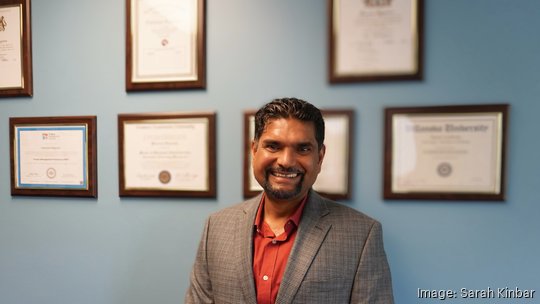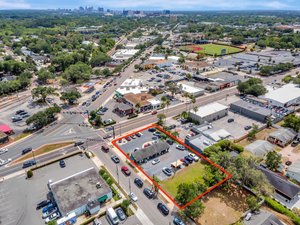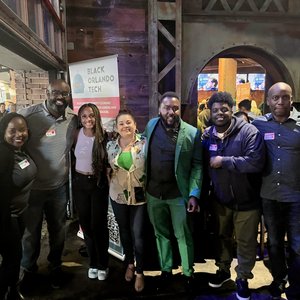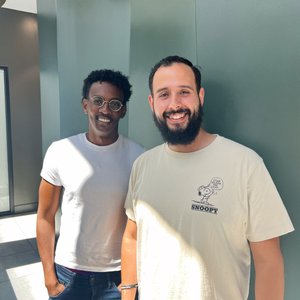
The home Parsram Rajaram grew up in was not high-tech by any measure, with one light bulb upstairs and one light bulb downstairs.
The director of information technology for the city of Winter Park was born and raised in La Jalousie, a small village in Guyana — a country nestled between Suriname and Venezuela. Rajaram sometimes marvels at his origins given the work he does today.
“We were dairy and rice farmers. We had a kitchen garden because selling vegetables was how you got money to go to school. We had chicken, ducks, cows, goats and sheep.”
His family barely made ends meet, but his mother worked exceptionally hard so Rajaram could be the first in the family to go to college, he said. Eventually, he studied electrical engineering at University of Guyana, earning a bachelor's degree.
Now, he’s been with the city for 20 years, and leads the team responsible for making Winter Park smarter.
The city of Winter Park recently adopted the phrase "smart city" to describe its efforts to use data and technology to improve life for residents and businesses. The city on June 15 will host a community meeting to gather feedback and ideas on its current smart city efforts, and seek additional technologies and data analysis that would improve life in Winter Park.
The smart city concept isn’t new. The Community Analysis Bureau government agency in the 1970s used computer databases, cluster analysis and infrared aerial photography to gather data, produce reports on neighborhood demographics and housing quality and "help direct resources to ward off blight and tackle poverty” in Los Angeles, according to Mark Vallianatos of online publication Gizmodo.
That’s the heart and soul of a smart city: actively using data to improve daily life and optimize city planning.
Winter Park already has implemented smart city elements over the past decade, and has more roll-outs planned in the future that should improve transportation, utilities and public safety. The feedback from the public meeting will help the city set priorities, Rajaram said.
Here, Orlando Inno talks with Rajaram, an adept communicator and strategic planner, about his background, what's on the horizon for Winter Park and more:
How did you end up in the United States?
After graduating in the 1990s, I came to New York and was promptly told, ‘Your engineering degree is of no value in America.’ So I started back from scratch. I worked at a sign shop delivering signs and eventually convinced my boss I could do more. I got into the art room and met a really nice guy there who said, ‘You're too smart to be doing this. Let me introduce you to this IT field.’
What happened next?
I couldn't afford the books for the Microsoft exams. But he taught me a trick. He said, 'Go to Barnes & Noble and buy the book, but you can return it within 30 days. That means you have to study for the exam and pass it before 30 days is over, return the book and get the next one.' In six months, I became certified in Microsoft Technologies.
Now you’re looking at what will it take for Winter Park to be considered a smart city. What does that mean to you?
Our smart city journey started at least 10 years ago. Only, we didn't say ‘smart city.’ We just called it technology implementation. For a decade, officers have had access to everything that they would if they were sitting in the office. They can run plates when they get [alerts to be on the look out for certain activity or people] and connect directly to the state system from their car. They also have the ability to use fingerprint readers to identify people who are in the system. This has been very helpful with our older residents suffering from dementia. Sometimes they wander without ID on them, and police have successfully identified them and brought them home. When we implemented that system many years ago, within the first couple of weeks, police actually caught someone from Georgia who was wanted for homicide because of easy-access fingerprinting while police were out in the streets. Our GIS (geographic information systems) allow residents to report potholes, downed trees, street light outages and so on. Thanks to geotagging, we know exactly what reports refer to, and if more than one resident reports the same event. Also, you don't have to come to city hall for the simple permits anymore. Boat permits, all your payments, parking, citations, invoices, utility billing, the permitting self service, where you can go and request inspections on your permits — all of that can be done remotely.
The city has a consultant, Magellan Consulting Group. Has it made any recommendations yet?
One that comes to mind immediately is lake level monitoring. Right now, we have to go out and physically measure the depth of the lake. But the company that provides our automated meter inventory and reading system, Sensus, can install sensors in the lakes that will automatically report the levels. It gives the lake management team that much more advantage, not having to manually measure to ensure that our lakes are managed properly, and perhaps we can prevent flooding if there’s a water event.
Is Winter Park currently using any simulation technologies?
Not yet. As we are going through this process with Magellan, one of the concepts that Orlando has embraced and that we also are looking into is the digital twin. It allows you to see what future development could look like, what future road expansion could look like, what happens if you have another fire station or if the population increases. It is something that I intend to pursue.
How do you stay informed on trends in smart city implementation?
There's an organization called the Florida Local Government Information Systems Association. We meet once a year and have roundtables to talk about technology, business, ease of procurement and all that stuff. There are a lot of points of comparison. Based on what we learn, we seek funding and consensus among the different departments to pursue projects that add value to the city. The one thing about technology is I don't think you implement it because it's a good technology; you implement it because the outcome is good. I always ask, ‘Can we solve a problem with technology?’
What's happening with fiber internet in Winter Park?
High-speed internet certainly is considered the fourth utility now. We've been told that Lumen intends to have all of Winter Park on fiber within 18 months. There’s a ton of undergrounding and directional boring. It's a lot of work, but if they have the funding and they're aggressive, they can get it done. There are other players here, too: Spectrum, Frog, Summit and others. We know that having reliable high speed internet is a factor that attracts people to move to places.
Parsram Rajaram
- Title: Director of Internet Technology, City of Winter Park
- Winter Park staffer since: 2007
- Areas of expertise: Systems engineering, IT service management, software, server administration, systems analysis, IT infrastructure management
- Contact: https://cityofwinterpark.org/departments/information-technology/
Sign up here for The Beat, Orlando Inno’s free newsletter. And be sure to follow us on LinkedIn, Facebook and Twitter.







